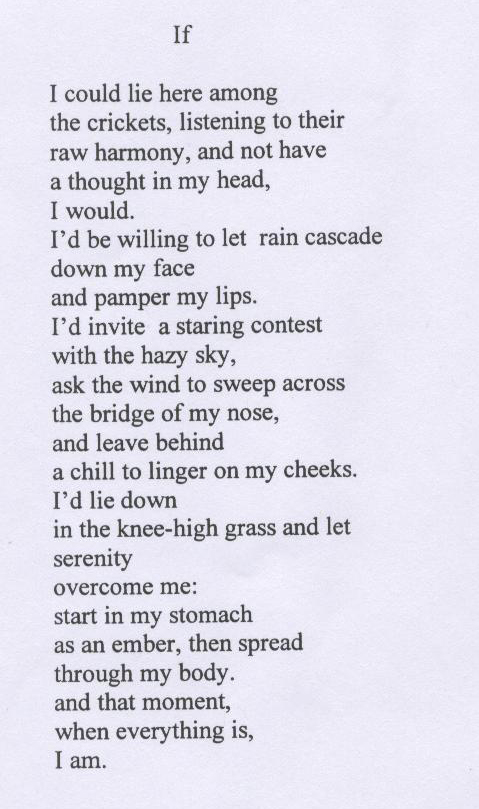2013
SARAH MOOK
POETRY PRIZE RESULTS
6-8 SECOND PLACE
Teddy
Mantel
Edgecomb, ME
 |
|
COMMENTS FROM CONTEST JUDGE MARIE KANE: The second place poem in this age group exhibits a mature voice, expert command of line breaks, and the use of imaginative diction to command the reader's attention throughout this admirable, understated poem. The first five lines invite us into the speaker's realm of possibility. The title of the poem, "If," is its first line. Next are:
We are drawn into
the writer's world of lying "among the crickets / listening to
their The next three lines of the poem explore what the speaker is willing to experience so that he or she might not "have a thought in my head." The poem reads: "I'd be willing to let rain cascade / down my face / and pamper my lips." The spot-on verbs, "cascade" and "pamper" are both visual and tactile; they also personify the rain and enhance the serenity felt in the poem. The poem continues with more of what the speaker wishes to experience:
What terrific visual imagery to "invite a staring contest / with the hazy sky." Certainly the implacable sky would win, but the poem allows for a chance of the speaker winning also; after all, he or she "invite[s]" the sky to the contest. In the end, I suspect it would not matter; the "staring" at the sky and the "invite" to do so are the aim, not who wins the contest. Experiencing the discomfort of a sweeping wind that "leave[s] behind / a chill to linger on my cheeks" convinces the reader that the letting go of 'self' in nature, having no thought, remains a prime motive. And, finally, the speaker would:
I present these lines to appreciate the poem's excellent line breaks; the speaker uses short and longer lines with purpose. The lines, "lie down / "in knee-high grass. . ." elicit a sense of childhood, escape, and surrender that appeal. For the speaker, this lying down would allow "serenity" to "overcome me." Note the word choice of "serenity"; its multi-faceted meaning suggests tranquility and peace, calmness and stillness, while the word "overcome" demonstrates nature's ability to surmount any barriers and impediments that civilization can produce. The poem ends with power and poise. The speaker believes that this overwhelming "serenity" would behave this way:
The transformative power of nature and resulting recognition create a meaningful ending. I especially appreciate an "ember" as a metaphor for the "spreading" warmth that the giving of oneself to nature engenders. The clarity of the
speaker's wish of giving into the force of nature is expertly done;
the reader feels this warmth and oneness also. This writer's natural
and easy voice, pleasing and understated tone, clear message, and effective
poetic technique make this a winning poem. Thank you for the privilege of reading your work! Marie
Kane |